If you’ve used Mellow Yellow Cold Pressed Rapeseed Oil for deep frying, follow our tips on what to do with oil after deep frying…
Reuse
As Mellow Yellow Rapeseed Oil has a high smoke point, you can reuse this oil after deep frying. Once you have used your oil for deep frying, leave it to cool down. Once it is completely cool, pour it through a muslin cloth, coffee filter paper or kitchen roll into a glass bottle or jar that can be sealed. Label the jar with the date you used it for deep frying, what you used it for and the best before date. Store your oil in a cool, dark place and use within six weeks. It is best to use the oil for deep frying similar foods in case any flavour has been imparted into the oil.
Recycle
Containers of cooking oil can be recycled by some local recycling centres. Check with your local council to see if they offer this service and then take it to the recycling centre in a sealed bottle or jar.
Dispose
If you need to dispose of your oil, you could put a few sheets of something absorbent, eg, kitchen roll or newspaper into your bin and then pour the oil onto this. The oil should then be absorbed and won’t make a mess in your bin. If you don’t have anything absorbent to pour the oil onto, you can wait until it has cooled down and then pour it either back into the bottle or into a glass jar with a lid and place in your rubbish bin.
What not to do with oil after deep frying
– Touch too soon – Make sure to leave to cool fully, oil gets VERY hot, so make sure it has had plenty of time to cool down before you touch it.
– Put on the compost heap – Pouring leftover cooking oil onto your compost heap can attract rodents and slow down the composting process.
– Pour down the sink – Never pour leftover oil down your sink as it will eventually blog the pipes and contributes to larger drainage problems.
What is rapeseed oil? Let us answer that for you here…
Rapeseed oil is the oil extracted from the small black seeds found in seed pods grown on the rapeseed plant, Brassica napus, a plant species which is a member of the brassica family. These seeds are tiny, quite hard black seeds with a bright yellow centre which holds a high oil content. To release this oil, the seeds must be either pressed or processed at a high temperature.
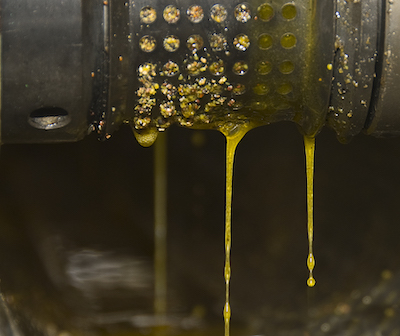
Rapeseed oil dripping from a press
We produce our Mellow Yellow Rapeseed Oil by a traditional cold pressing method which we like to call the ‘process of no process’. We simply squeeze the seeds in a screw press and collect the oil that is released. The screw press is very simple and is an incredibly traditional food production method. A slowly turning screw uses pressure to gently squeeze the seeds which releases the oil. This oil is then passed through a filter (a bit like coffee paper) and then it is ready to go into bottles to be used in your kitchen.
Not all rapeseed oil is produced in the same way though. Some companies use a chemical extraction method to produce refined rapeseed oil. This involves quite an intense process where the rapeseed oil is extracted from the seeds under high temperatures, then is bleached and deodorised using chemicals to create a flavourless and colourless oil. This is often sold as vegetable oil in large quantities to be used for deep frying.
Stages of growth of a rapeseed plant
We sow the seeds into the earth in August straight after harvest time. The seeds are then left to grow throughout September and October with the rain at this time of year helping. Growth slows down from November to February until Spring arrives and it starts to warm up. We put fertiliser on the fields at this time to help the growth. From April onwards, the rapeseed plant continues to grow, becoming a tall, green plant with yellow flowers, about 1m high.
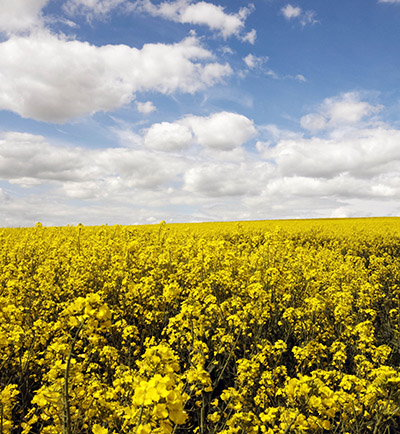
Rapeseed flowers
These yellow flowers appear around May and June time. The flowers then die, leaving a seed pod to grow in their place. This seed pod develops over the late summer months until August when harvest takes place.
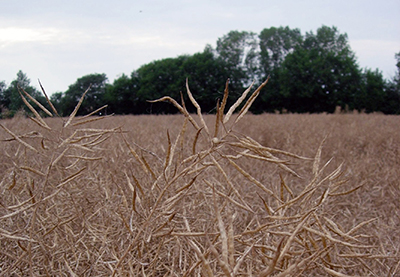
Rapeseed pods ready for harvest
A combine harvester cuts down the plant and breaks the seed pods open to release all the little black seeds that have formed. These seeds can then either be planted again to grow even more rapeseed plants the next year, or can be gently cold pressed to produce cold pressed rapeseed oil.
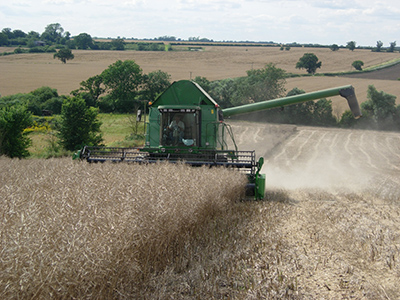
Harvesting rapeseed
What is rapeseed oil also known as?
In the UK, we refer to it as ‘rapeseed oil’ or ‘cold pressed rapeseed oil’ depending on the way it is produced. However, in Canada and the USA, they know it as ‘canola oil’. This stands for Canadian Oil Low Acid, which refers to the low erucic acid of the product.
Some people ask us if we use any genetically modified (GM) rapeseed. Our seeds are not GM and additionally, they are LEAF Marque. LEAF stands for Linking the Environment And Farming and means that they we are independently audited to ensure that our farming methods are both sustainable and sensitive to the environment.
What is rapeseed oil used for?
With a high smoke point, rapeseed oil is a brilliant culinary oil and is great for roasting, frying, baking or dressing. Take a look at our recipes using Mellow Yellow Rapeseed Oil here. As well as a culinary oil, we use our Mellow Yellow Cold Pressed Rapeseed Oil as an ingredient for our range of salad dressings, infused oil and mayonnaise. With its subtle nutty flavour and low saturated fat content, it is perfect for this and creates delicious and healthy dressings and mayonnaise with a beautiful yellow colour.

Mellow Yellow range
What is so special about Mellow Yellow Rapeseed Oil?
– Duncan Farrington, a fourth generation farmer, was the UK’s original seed-to-bottle producer of cold pressed rapeseed oil back in 2005.
– Our rapeseed is grown to LEAF Marque standards, a system designed to promote environmentally responsible and sustainable farming.
– Grown, cold pressed and bottled on the Farrington’s family farm in Northamptonshire.
– Flavour is key. Our cold pressed rapeseed oil is not brash or punchy, with mellow nutty and buttery tones.
– 90% less saturated fat than coconut oil and half the saturated fat of olive oil.
– Ten times more Omega 3 than olive oil with a healthy balance of Omega 3, 6 and 9.
So what is rapeseed oil? It is a brilliant culinary oil that is produced from the oil found in seeds from the rapeseed plant. Cold pressed rapeseed oil is produced by gently squeezing the seeds and has a subtle nutty flavour and is low in saturated fat with a high smoke point. Find out more about Farrington’s Mellow Yellow Rapeseed Oil here and find your local stockist here.
Did you know that making cakes with oil is just as easy and tasty as using butter? Well we have plenty of recipes for you to get started baking with oil.
One of the main benefits we find when making cakes with oil is that you no longer have to struggle to combine hard butter with sugar. Simply pour your oil into a mixing bowl with your sugar and mix, as the oil is a liquid you will find it so much easier and quicker to combine the two.
With a subtle nutty flavour, Mellow Yellow Cold Pressed Rapeseed Oil is great for making cakes as this nuttiness is very subtle but adds a wonderful depth of flavour to your bakes.
As well as being easier and with a delicious flavour, using Mellow Yellow for baking acts as a brilliant butter substitute so you can make vegan or dairy free cakes.
Our favourite recipes…
Courgettes make this tasty cake wonderfully moist. With a lime cream cheese frosting, the sweetness is perfectly balanced to create a cake that doesn’t feel heavy or too indulgent. Our recipe can be found here.
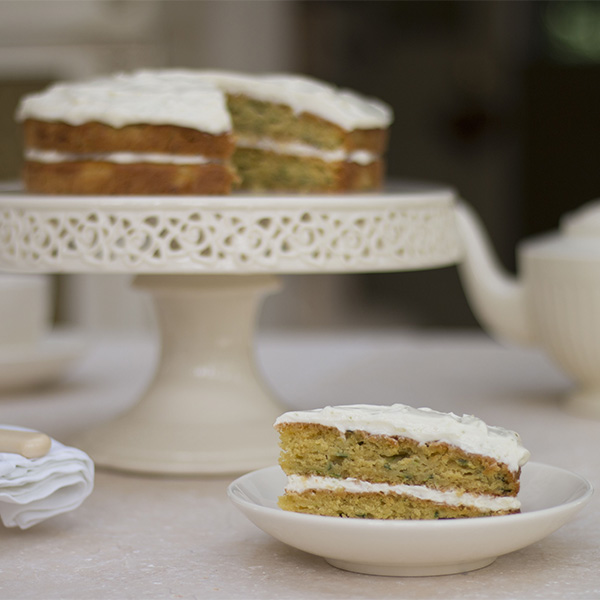
A seasonal delight and a refreshing change from rhubarb crumble. Almond and rhubarb join together in this delicious cake, an easy yet impressive bake to enjoy during the rhubarb season. Enjoy with a dollop of creme fraiche for a simple and delicious dessert, recipe here.
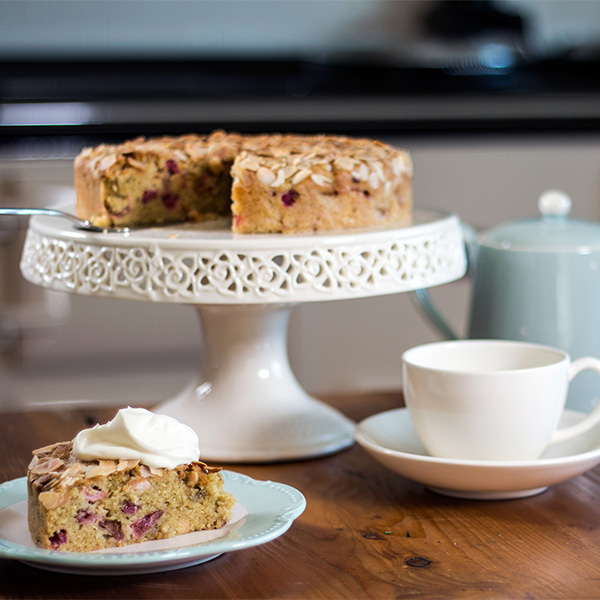
We love making delicate little apple roses to decorate this cake with. Thanks to the apple, this recipe creates a particularly moist cake that is wonderful enjoyed with a cup of tea. Fill with whipped cream for that extra indulgent touch!
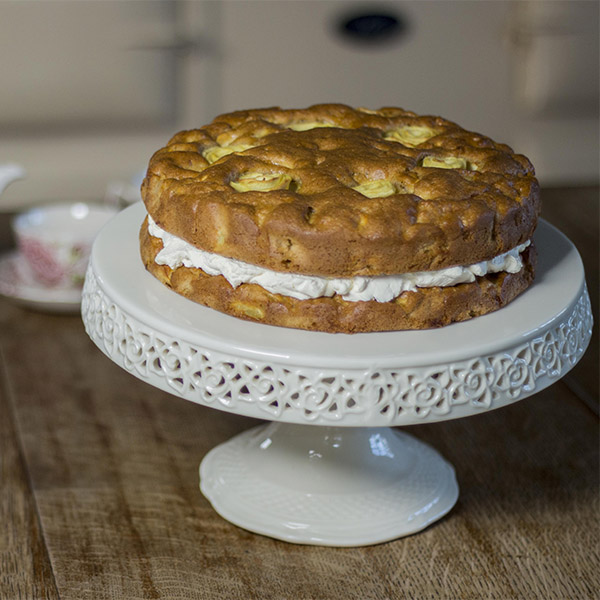
This recipe is made in one bowl to keep it super simple and reduce washing up. Use overripe bananas rather than throwing them away to keep your food waste to a minimum and enjoy this delicious banana bread in the process, find our recipe here.
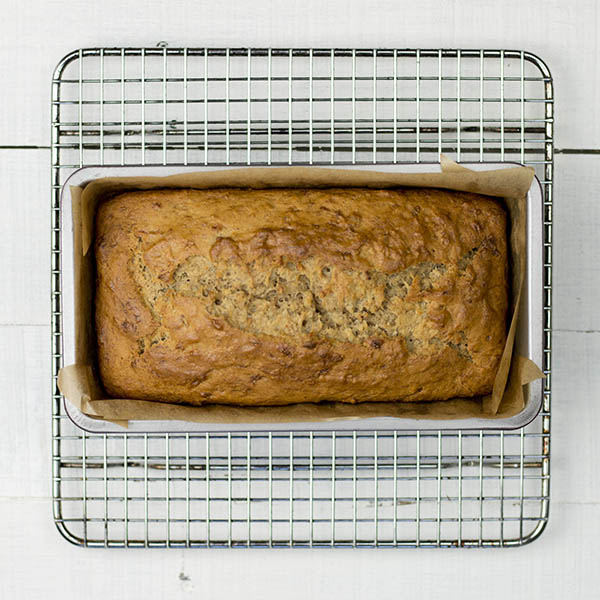
This cake is fantastic, especially when made with seasonal British plums which create a lovely decoration on top the cake. With ground almonds in the sponge, this cake has a lovely nutty flavour to it which is complemented by the sweetness of ripe plums.
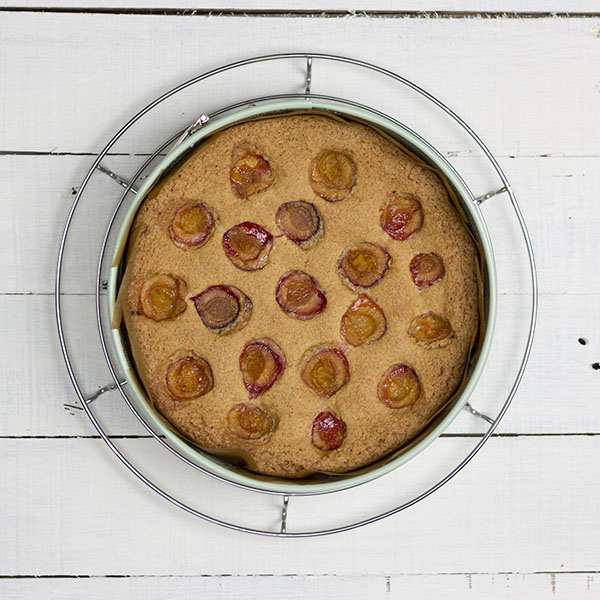
We hope these tasty recipes inspire you to start making cakes with oil!
For more information on our brilliant cold pressed rapeseed oil, visit our Product page.
For stockists, visit our Where To Buy page.
For more recipe inspiration, visit our Recipe page.
The rapeseed crop has been grown in Britain for a number of centuries, in fact, it was first introduced to the UK by the Romans. Rapeseed is a brassica and is related to such plants as the cabbage, mustard and turnip for example. Rapeseed became a popular crop in the UK from the 1970’s, as farmers were encouraged to grow it due to increasing demand for a refined British rapeseed oil by food manufacturers, as an alternative to other imported refined oils. The oil also became popular in Canada and the USA and became known as canola oil.
Rapeseed continued to be used purely as a refined oil until 2005, when Duncan Farrington became the UK’s first seed-to-bottle producer of cold pressed rapeseed oil. After studying the oil as part of his degree, he was fascinated by the health and culinary benefits when it was cold pressed. So, in 2005 he set up a small press on his family farm and started cold pressing the rapeseed grown in his fields. The oil was a huge success and British cold pressed rapeseed oil is now a store cupboard staple for many households up and down the country.

Benefits of cold pressed rapeseed oil
– Half the saturated fat of olive oil and ten times less than coconut oil
– Healthy balance of Omega 3, 6 and 9
– 10 times more Omega 3 than olive oil
– A rich source of vitamin E
– Contains plant sterols and phenols
– High smoke point of 230°C
– Subtle, nutty flavour with buttery notes
Producing British Rapeseed Oil
We are so proud to produce British rapeseed oil. As we grow, press and bottle our Mellow Yellow oil on our farm in Northamptonshire, it is truly British. Normally planted in August, a rapeseed crop is incredibly difficult to establish as it needs perfect conditions for it to survive the first couple months as it emerges through the soil. To ensure success the crop requires a combination of good soil nutrition and structure; moisture in the soil (but not too much); warm soils, ideally over 9°C; no pests, especially Cabbage Flea Beetles and Slugs, both of which find newly emerged tender leaves incredibly delicious and can decimate a crop in a matter of days. Later in the winter months, pigeons also enjoy eating the leaves which we try to stop with bird-scarers.
If the farmer’s skill, along with a bit of mother nature’s help get the crop through to the spring, then rapeseed starts looking after itself as the days lengthen and the weather warms. From late February onwards it starts waking up and literally grows before your eyes, going from a small cabbage like plant to something over a metre tall in a matter of weeks. By April the crop starts flowering, giving the countryside the recognisable yellow fields. The flowers are pollinated by native bumble bees, to produce the tiny black seeds ready to harvest some eleven months after the crop was first planted.
As well as the weather affecting the growth of the rapeseed crop, weather conditions at harvest time also affects the quality of the finished oil. Ideally the seeds need to be harvested in cool dry conditions, as moist warm conditions will spoil the crop and encourage the growth of moulds. Once harvested, the seed is stored with the moisture and temperature carefully controlled to ensure the seed is keep in the best possible condition, ready to be cold pressed to make a deliciously healthy, quality British rapeseed oil.
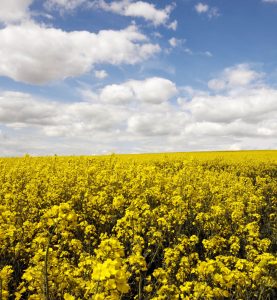
Where to buy British Rapeseed Oil
Farrington’s Mellow Yellow Rapeseed Oil is available nationally from Booths, Morrisons, Ocado, Sainsbury’s, Waitrose and many independent farm shops and delis. In order to find your local stockist, visit our Where to Buy page and just enter your postcode.

Cooking oils are a type of fat. Fat is a macronutrient (like protein and carbohydrate) that is made up of fatty acids. With so many different cooking oils available, most people don’t know which oil they should be using in their cooking for the healthiest results and often ask us what is the healthiest oil to cook with . This article will help to explain the different factors you should consider when choosing which oil to cook with.
What should we consider when looking at what is the healthiest oil to cook with?
When trying to decide which oil to cook with, we need to look at the following things. (We’ll explain each one a bit later on!)
– Saturated fat
– Unsaturated fat
– Trans fat
– Omega 3, 6 and 9
– Smoke point
– Vitamins and minerals found in the oil
What is fat?
Fat is a macronutrient (like protein and carbohydrate) and is made up of fatty acids. These fatty acids can be classified as saturated or unsaturated depending on their chemical structure. Unsaturated fatty acids include monounsaturated fatty acids and polyunsaturated fatty acids.
All fats provide 9 calories (kcal) per gram, regardless of the levels of saturated and unsaturated fatty acids, the big difference is the effect these fats have on your cholesterol levels so we need to ensure that we eat the healthiest fat we can.
Fat is a good source of energy and we need some fat in our diet to help us absorb the fat soluble vitamins A, D, E and K.
Within the body, fatty acids form part of our cell membranes and fat also helps to insulate and protect our internal organs, contributing towards maintaining our body temperature and is involved in lots of body processes such as the development of our brains and the communications which occur between different cells. Cholesterol is needed to produce bile acids, which help us to digest food, and also some of our hormones.
What is Saturated Fat?
Saturated fat is found in foods such as fatty meats, hard cheese and butter.
High intakes of saturated fat have been shown to raise levels of ‘bad’ (LDL – Low Density Lipoproteins) cholesterol in the blood. High blood cholesterol increases the risk of developing heart disease and stroke by building up in our arteries, causing them to narrow. It is best to eat foods that contain less saturated fat.
An easy way to tell if your oil contains high levels of saturated fat is whether it is solid at room temperature, if it is, it most likely contains a high amount of saturated fat.
Chemically speaking, saturated fats have don’t have any double bonds between their carbon atoms in the fatty acid chain.
What is Unsaturated Fat?
Often called ‘good fat’, unsaturated fat help to maintain a healthy cholesterol level and have even been known to help lower levels of harmful cholesterol. Unsaturated fats are either monounsaturated or polyunsaturated.
Our bodies are able to make most of the specific fatty acids we need apart from two polyunsaturated fatty acids which we must get from our diet. These two fatty acids are alpha linolenic acid (an omega 3 polyunsaturated fatty acid) and linoleic acid (an omega 6 polyunsaturated fatty acid). Our bodies need these for brain development, growth and for a healthy immune system.
Omega 3 and 6 are called essential fatty acids as we need to obtain small amounts of them from our diet. Alpha linolenic acid is found in rapeseed, walnut and soya oils and spreads made from these. Linoleic is also found in plant based oils such as sunflower, corn, peanut, rapeseed, olive, safflower, sesame, walnut and soya oil and spreads made from these. Both of the essential fatty acids are present in smaller amounts in foods such as meat, eggs and oily fish. Ideally our bodies need Omega 3 and Omega 6 in the right balance of one part Omega 3 to every two parts Omega 6.
What about Trans Fat?
These are the worst types of fat and should be avoided wherever possible as they have been known to increase blood cholesterol levels. Typically, foods with hydrogenated oils likely contain trans fats, such as fried foods, takeaways and hard margarines.
As you can see, the levels of saturated and unsaturated fat in your cooking oil is very important. We have broken down the most common oils in the simple table below for you.
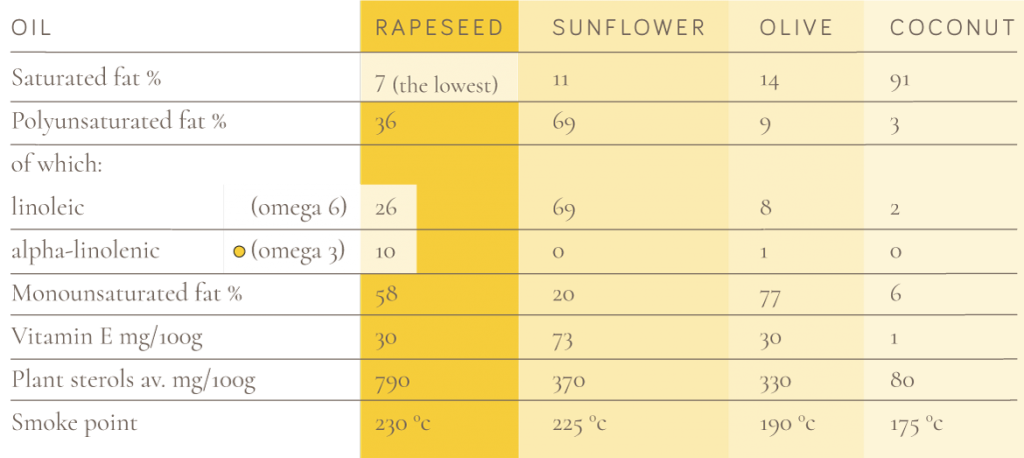
* Ideal balance of Omega 3 to Omega 6.
Does Smoke Point matter?
Other than the levels of different fats in your oil, if you are cooking with oil, you need to ensure that the smoke point is suitable. It can be dangerous to take an oil over its smoke point as this can cause the chemical structure to break down, which is why we always recommend cold pressed rapeseed oil for high temperature cooking as it has a smoke point of 230°C.
Are Vitamins and minerals found in oil?
Some oils, especially those that are cold pressed, can contain naturally occurring vitamins and minerals. Plant sterols can also be found in some oils, learn more about these in our blog post.
Cold pressed rapeseed oil contains vitamin E, vitamin K and catotenoids including provitamin A. Vitamin E is an important antioxidant and vitamin K is needed for efficient blood clotting. Provitamin A is essential for healthy skin, eyesight, growth and reproduction and, carotenoids contain luteins which are an antioxidant and give the oil its distinctive yellow colour.
So what is the healthiest oil to cook with?
We want an oil with low saturated fat, high unsaturated fat (including both polyunsaturated and monounsaturated), a high smoke point and containing as many other vitamins and minerals as possible.
The obvious choice has to be cold pressed rapeseed oil (but we would say that, wouldn’t we!) From the table, we can see that cold pressed rapeseed oil has the lowest saturated fat levels, a good balance of both types of unsaturated fat, a high smoke point and also contains vitamin E and plant sterols.

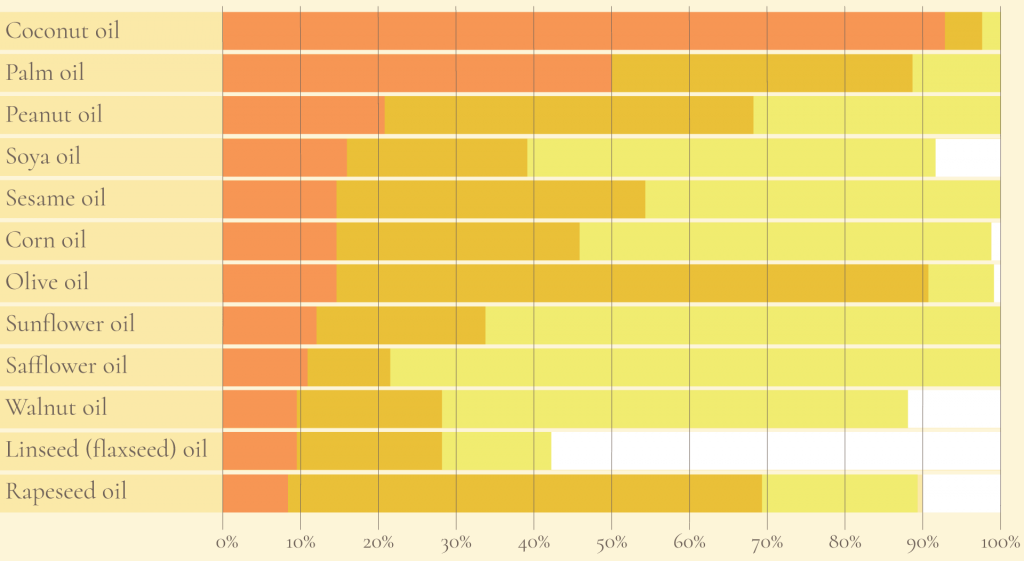
All oils contain a mixture of unsaturated fat and saturated fat and the healthiest ones to use are those with the lowest saturated fat and highest unsaturated fat.
So, if you’re asked what is the healthiest oil to cook with, you now know that you want an oil with a low saturated fat content and high in unsaturated fat. Cold pressed rapeseed oil is ideal, find out more here and find stockists here.
In May this year, when our rapeseed fields were looking their best in full bloom, Nadiya Hussain and a filming crew from Hungry Gap Productions came to Bottom Farm to learn more about how we produce our cold pressed rapeseed oil. The reason for the visit was to film a segment for Nadiya’s new series, Nadiya’s Family Favourites!
Starting in the fields, Duncan explained how he grows the rapeseed to LEAF (Linking Environment and Farming) Marque standards and how the plant grows. He then showed Nadiya the cold pressing method we use and how we bottle our oil.
As Nadiya is obviously a brilliant baker and chef (she won the Great British Bake Off in 2015) she was keen to learn more about cooking with Mellow Yellow Cold Pressed Rapeseed Oil! So she headed off to The Mermaid in Ellington and head chef, Nick Marriot put her taste buds to the test with a roast potato challenge. After cooking roast potatoes in either cold pressed rapeseed oil, sunflower oil or olive oil, Nick challenged Nadiya to identify each oil. With it’s high smoke point giving super crispy roasties and subtle nutty flavour, she easily spotted the ones cooked in Mellow Yellow!
We absolutely loved having Nadiya visit us at Bottom Farm, it was a fantastic day and watching ourselves on TV is incredibly exciting! If you didn’t catch the episode live last week, you can catch up on BBC iPlayer now: https://www.bbc.co.uk/iplayer/episode/b0bc26qk/nadiyas-family-favourites-series-1-1-family-days-out
Nadiya’s Family Favourites is on BBC2 every Monday at 8pm.
We all know that food waste is a growing problem. In 2016, British shoppers threw away a shocking 160 million bananas! Alhough they may be the countries favourite fruit to snack on, they are also the most wasted. Unfortunately, 1 in 3 people will throw away a banana if it has a bruise or even a single black mark on its skin. It really is bananas!
Here at Farrington’s, we think that one of the best ways to cut down food waste is to shout about all the amazing recipes that you can use these ingredients in, rather than throwing them away. So, here are our Top 5 Leftover Banana Recipes…
If you’re not ready to make any of these recipes straight away, just peel and slice your bananas, and then freeze them in a Tupperware box or freezer bag. Once in slices, the frozen bananas are perfect for smoothies or any of our other recipes. You’ll have banana ready to go in your freezer for whenever you fancy making one of these recipes!
Banana Bread – The original way to use up bananas. Banana bread is a regular in the Mellow Yellow kitchen as it is such a simple cake to bake and gives truly delicious results! We have two well loved recipes, click here for our traditional recipe and here for our vegan alternative!

Banana Ice-Cream – Freeze bananas as they go past the point you would like to eat them. Cut the frozen bananas into a food processor and add 1 generous tablespoon of vanilla yogurt (or any other type of dairy like quark, double cream, forage frais) per banana. Blitz until smooth. Each banana creates two scoops of ice cream. Serve immediately. (Preferably with warm brownies.)
Vegan Pancakes – If you want to try vegan pancakes, ripe bananas are perfect. Simply mash 1 banana and whisk together with 150ml coconut milk (or any other milk alternative you like), 100g plain flour and ½ tsp baking powder. This mixture is meant to be pourable so if it’s too thick just add a splash more milk, or if too runny add another spoonful of flour. Heat up some Mellow Yellow Rapeseed Oil in a frying pan and dollop large tablespoons of your mixture in to cook. Cook each pancake for 2-3 minutes, flipping when bubbles begin to appear on top, then cook for a further 2 minutes. Serve your pancakes in a big stack with your choice of sauce drizzled over.
Carrot and Banana Cake – Our oldest and most loved cake recipe. So easy, delicious and freezes well – a total favourite. The carrot and banana cake is a great afternoon tea sweet choice and a fantastic way to cut down on your food waste by using bananas rather than throwing them away. Find the recipe here.
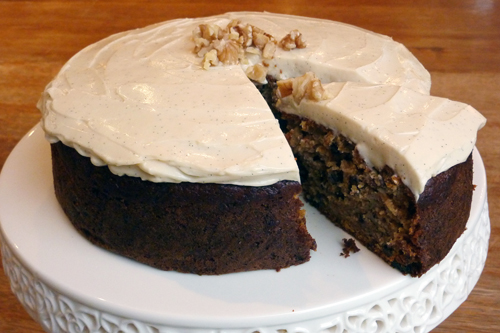
Smoothies – Overripe or frozen bananas are perfect for smoothies! Simply add them to your blender with any other fruit, milk or yogurt you have and after a a quick blitz, you’ll have a delicious and filling breakfast smoothie!
What do you use your leftover bananas for? Share your recipes with us on Facebook, Twitter or Instagram!
Did you know that cold pressed rapeseed oil is a great, heart-happy oil? Are you looking to improve your health? Well we have one simple change for you that will help you with this goal. Mellow Yellow Cold Pressed Rapeseed Oil is a brilliantly healthy, British cooking oil that is grown, pressed and bottled in Northamptonshire. Read on to find out more about all the fantastic health benefits of cold pressed rapeseed oil…
Top 4 Health Benefits of Cold Pressed Rapeseed Oil
Low saturated fat
A balance of Omega 3 and Omega 6
Contains Vitamin E
Naturally occurring plant sterols
Low saturated fat
Saturated fat is usually found in high levels in fatty meats, full fat dairy products, coconut oil and lard. For many years, health professionals have advised against consuming high amounts of saturated fat as they have been shown to raise your LDL (Low Density Lipoprotein) levels. LDL is known as ‘bad’ cholesterol as high levels of LDL blood cholesterol increases the risk of heart disease by building up in our arteries and causing them to narrow. Cold pressed rapeseed oil, however, has very low levels of saturated fat. This is one of the major health benefits of cold pressed rapeseed oil! For more information from the British Heart Foundation, click here.
A balance of Omega 3 & Omega 6
Mellow Yellow Cold Pressed Rapeseed Oil contains both Omega 3 and Omega 6. These are essential fatty acids that the body is unable to produce itself so we need to ensure that we consume these in our diet. These two essential fatty acids contribute to brain development, growth and maintaining a healthy immune system. It is important that we consume these two fatty acids in the correct ratio as found in cold pressed rapeseed oil. It is this ratio that makes this one of our top health benefits of cold pressed rapeseed oil. We have more information on Omega 3 and 6 on our Health and Nutrition page.
Contains Vitamin E
Another of the health benefits of cold pressed rapeseed oil is that it contains vitamin E. Vitamin E occurs naturally in cold pressed rapeseed oil and is needed for a strong immune system and healthy eyes and skin.
Naturally occurring plant sterols
Last but not least in our top health benefits of cold pressed rapeseed oil are the naturally occurring plant sterols found in this brilliant oil. Plant sterols are fat-soluble compounds found in some vegetables, nuts and seeds, including rapeseed. They are similar in structure to cholesterol therefore when eaten, plant sterols compete with cholesterol for absorption into the bloodstream. Our bodies find it easier to absorb plant sterols as they block the cholesterol from being absorbed. This results in the cholesterol passing through and out of the body via the stool. Find more information here.
Comparison of oils:
With these brilliant health benefits of cold pressed rapeseed oil, it’s easy to see why so many people are swapping to Mellow Yellow Rapeseed Oil! Find out where to buy here.
If you want to know more about cold pressed rapeseed oil, how we produce it, how it grows, the simple way we press the seeds to produce our cold pressed rapeseed oil and more on what is so special about cold pressed rapeseed oil, have a look at this article!
For recipe inspiration on what to cook with cold pressed rapeseed oil, visit our Recipe page here.
As the UK’s first seed to bottle producer of rapeseed oil, our British heritage is incredibly important to us! From 24th September to 8th October, the UK has been celebrating British Food Fortnight with the hashtag #BritishFoodFortnight. To show our passion for British food, we’ve been sharing our favourite recipes on Twitter each day. In case you missed these recipes, we’ve collated them all here for you. So take a look through and let us know which ones you’ll be trying next.
No self-respecting roast dinner would ever be seen without these by its side. Using our British cold pressed rapeseed oil on your Sunday roasties ensures you the crispiest potatoes. Thanks to the high smoke point of the oil, your potatoes can get nice and hot, helping them get that crispy coating.
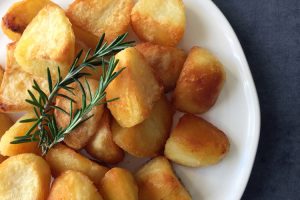
A quintessentially British fruit, the humble plum sings in this Plum Cake recipe. With ground almonds to add a nutty flavour, this cake is fantastic for a Sunday afternoon tea, or even just to whip up mid-week for a surprise guest!

Using British beef, this recipe will always go down well when brought to the table. Simple, perfectly seasoned and deliciously succulent, it truly is a classic dish. We love our steak served with potato wedges and garlic mushrooms, but there are so many other options you could choose from.
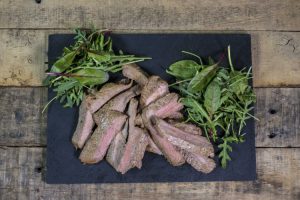
Almond and rhubarb make perfect partners in our Rhubarb Cake, which is an easy yet impressive bake. This is a fantastic way to use any seasonal rhubarb you have, as well as impressing your family with a delicious treat for them to tuck into!

One Pot Honey & Mustard Parsnip Chicken
This recipe uses our Honey & Mustard dressing as a delicious cooking sauce. Simply pour the sauce over your chicken thighs and British parsnips, pop it in the oven and there you go, a tasty one pot dish that’s perfect to warm you up during the colder weather that British Food Fortnight signals.
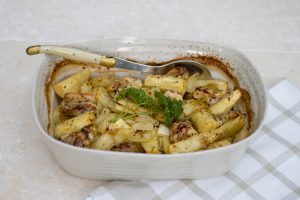
Usually eaten at Easter time, British lamb can also be sourced later on in the year with a stronger, more developed flavour. Our recipe for Roast Lamb uses garlic, rosemary, lemon and plenty of seasoning to bring out the most flavour possible from your lamb.
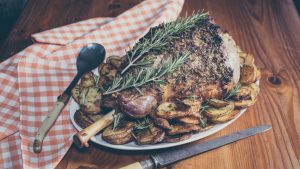
A true British favourite, we couldn’t talk about British Food Fortnight without including these. In our opinion, no matter what meat you’re having, no Sunday roast is complete without a Yorkshire pudding brimming with gravy. Get your oil nice and hot, ours has a high smoke point which really helps, to get those puddings rising nice and high!

Blueberry & White Chocolate Muffins
The delicate flavour of Mellow Yellow lends itself perfectly to cake baking and is particularly good in these marvellous muffins. Blueberry and White Chocolate Muffins fresh from the oven will attract the entire household, so make sure to grab one for yourself before everyone else descends!
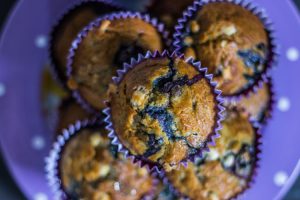
Such a simple side to make, and goes with so many different things. We like using British rooster potatoes in our Potato Wedges, but you can use any type of potato. A drizzling of Mellow Yellow and a good pinch of salt is all you need to create the most delicious wedges to be enjoyed by the whole family.

A beautifully light and fluffy lemon cake with a zesty lemon drizzle icing. Quick and easy for an everyday treat for the family but makes an impressive afternoon tea centerpiece if you’re planning a party.

Fresh Asparagus and Mellow Yellow Mayonnaise
British asparagus has to be one of our highlights of June, especially when combined with our delicious Mellow Yellow Mayonnaise. Our favourite way to serve this is by BBQ’ing the asparagus then serving it in a big pile with plenty of mayo ready for dipping!

This recipe produces a really easy, moist fruity apple cake. A perfect way to use up any seasonal British apples (cookers or eating apples) whichever you have in the garden or the fruit bowl. Served with creme fraiche, or even ice cream if the weather is warm enough, this cake is sure to be a hit!
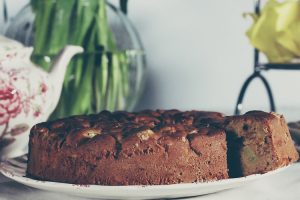
A wonderfully unusual way to use courgettes when in season. This fluffy courgette cake with its delicious lime cream cheese filling is a coffee morning or afternoon tea show stopper!

Pastry no longer needs butter! Using our incredibly simple recipe, you can make a quick and delicious pastry with Farrington’s Mellow Yellow Rapeseed Oil. This recipe is for a fruity Blackberry and Apple Galette, perfect with a hearty pouring of custard or double cream.

British Food Fortnight has been a great way for us to shout about all the amazing food produced in Britain, but just remember to keep buying British! Tweet us and let us know which recipe is your favourite!
We are over the moon to have won not one, not two, not even three, but SIX stars at the 2017 Great Taste Awards for our Farrington’s Mellow Yellow products this year. The judges have awarded a 1 star Great Taste award to each of our Classic Vinaigrette, Honey & Mustard Dressing, Balsamic Vinegar Dressing, Chilli Oil, Mayonnaise and Garlic Mayonnaise. For most products, this is their second, or even third Great Taste award but for our Chilli Oil, this is the first time it has been awarded a Great Taste star and we couldn’t be happier!
The Great Taste awards are the world’s largest and most trusted food and drink awards, with a panel of over 500 experts judging each product, being described as the ‘Oscars of the food world’. This year, 12,366 food and drink products entered into these prestigious awards, with only the very best products being awarded the coveted stars.
Here’s what the judges had to say about our products:
Chilli Oil: A wonderful colour and clarity. The nuttiness of the oil is retained and a subtle hint of chilli makes a wonderful condiment for cooking.
Balsamic Dressing: Lovely fruity sweetness that lifted the palette.
Classic Vinaigrette: Herbs add to the complexity of flour with all the ingredients working in harmony.
Honey & Mustard Dressing: The honey flavour balances well with the mustard. Love the ‘pop’ of the mustard seeds too.
Mayonnaise: A very good colour, and the rapeseed oil really works well here. It’s light and creamy textured, and well seasoned with a light hand.
Garlic Mayonnaise: Good clean creamy mayo with a well-judged hint of garlic. Lovely richness and mouthfeel.
We’re so proud of all our brilliant products, so if you haven’t tried them all, head over to our Where to Buy page and find your local stockist!

